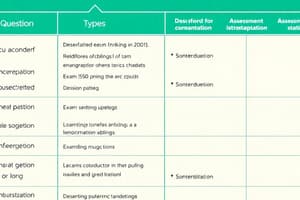Podcast
Questions and Answers
Apa itu jenis pertanyaan yang memerlukan siswa untuk memberikan penjelasan atau justifikasi tertulis singkat?
Apa itu jenis pertanyaan yang memerlukan siswa untuk memberikan penjelasan atau justifikasi tertulis singkat?
Pertanyaan jawaban singkat
Apa keuntungan dari penggunaan pertanyaan pilihan ganda dalam ujian?
Apa keuntungan dari penggunaan pertanyaan pilihan ganda dalam ujian?
Pengukuran efisien konsep dasar
Apa perbedaan utama antara pertanyaan pilihan ganda dan pertanyaan jawaban singkat?
Apa perbedaan utama antara pertanyaan pilihan ganda dan pertanyaan jawaban singkat?
Pilihan jawaban yang sudah ditentukan vs penjelasan singkat
Mengapa pertanyaan pilihan ganda sering digunakan dalam ujian?
Mengapa pertanyaan pilihan ganda sering digunakan dalam ujian?
Apa yang dinilai dalam pertanyaan jawaban singkat selain pengetahuan?
Apa yang dinilai dalam pertanyaan jawaban singkat selain pengetahuan?
Bagaimana guru biasanya memberikan penilaian pada pertanyaan jawaban singkat?
Bagaimana guru biasanya memberikan penilaian pada pertanyaan jawaban singkat?
Apa itu ujian esai?
Apa itu ujian esai?
Apa yang diuji dalam ujian praktis?
Apa yang diuji dalam ujian praktis?
Apa itu ujian lisan?
Apa itu ujian lisan?
Apa perbedaan antara ujian esai dan ujian praktis?
Apa perbedaan antara ujian esai dan ujian praktis?
Apa contoh ujian praktis yang bisa dilakukan oleh mahasiswa teknik?
Apa contoh ujian praktis yang bisa dilakukan oleh mahasiswa teknik?
Apa yang dinilai dalam ujian lisan untuk musisi?
Apa yang dinilai dalam ujian lisan untuk musisi?
Study Notes
Understanding Exams: A Comprehensive Look at Various Formats
Examinations, commonly known as 'exams,' serve as valuable tools to assess students' knowledge and abilities across diverse subjects and skill sets. Throughout history, educators have used different formats to design these evaluations, tailoring them based on specific learning outcomes and disciplines. Let's explore some of the most common forms of tests encountered by learners of all ages.
Multiple Choice Questions (MCQ)
MCQ is one of the widely implemented test formats due to its ease of administration and standardization. In this format, each question offers several possible answers from which only one option is correct. Students select their response using a predefined set of options like circling letters or clicking radio buttons. MCQ questions allow efficient measurement of fundamental concepts while minimizing subjectivity in grading responses.
Short Answer Questions
Unlike multiple choice questions, short answer questions require students to produce brief written explanations or justifications instead of simply selecting a predetermined answer. This type of examination demands more critical thinking skills and concise verbal communication. Teachers often assign points relative to how completely and accurately the student responds; thus, it's essential to address the entire concept rather than merely recall information from memory.
Essay Question
Essays represent a formidable challenge for many students because they necessitate complex thought processes, analytical ability, and strong writing skills. Essay questions demand that students convey extended arguments related to a particular theme or issue within specified limits, typically ranging between two paragraphs and ten pages depending upon the context. Scorers evaluate essays based on criteria such as clarity, organization, development of ideas, depth of analysis, and usage of relevant evidence.
Practical Tests
Practical examinations test students' ability to apply theoretical principles to real-world situations through hands-on activities, demonstrations, experiments, or performances. For instance, science pupils may conduct lab exercises to verify learned theories, engineering graduates might demonstrate problem-solving techniques using mathematical models, or art college applicants could display portfolios showcasing creative expression skills. Assessors usually examine practical work according to established benchmarks of competence and proficiency.
Oral Test
Oral testing involves asking students direct questions that require oral responses. Interview-based methods gauge communication capabilities, fluency, confidence, and interpersonal skills. These exams vary significantly among subjects — for example, medical professionals must confidently explain diagnoses, treatments, and medical procedures to patients, whereas musicians would perform pieces or improvise spontaneously during recitals.
In conclusion, understanding various types of exams helps learners prepare effectively for their academic future. As you navigate your education journey, familiarize yourself with these assessment styles so that you can study and excel efficiently.
Studying That Suits You
Use AI to generate personalized quizzes and flashcards to suit your learning preferences.
Description
Explore the different formats of exams, such as multiple choice questions, short answer questions, essays, practical tests, and oral tests. Learn about each format's unique characteristics, challenges, and how they assess students' knowledge and skills effectively.




